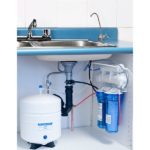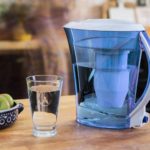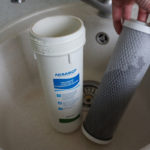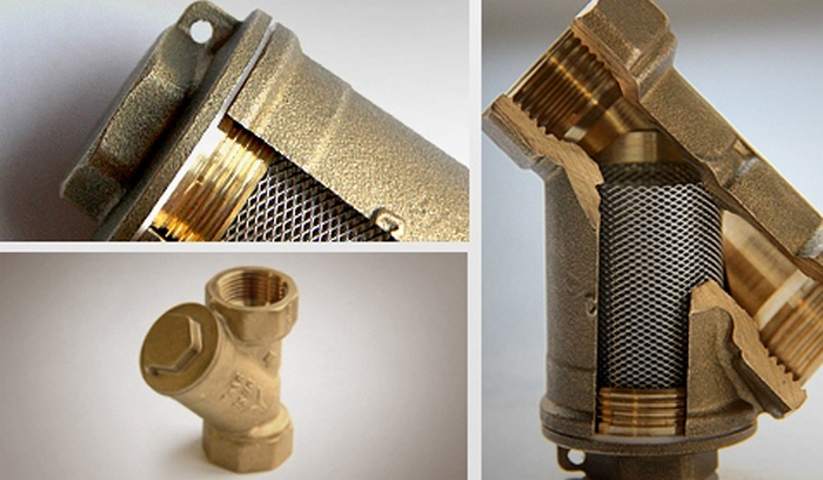Which water filter is better?
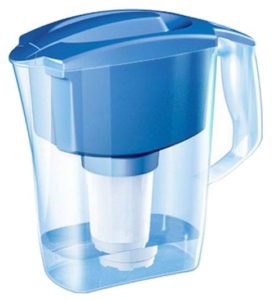 There are several types of water filters for home use on the market today. To choose the appropriate option, you need to familiarize yourself with the operating mechanism, advantages and disadvantages of each type.
There are several types of water filters for home use on the market today. To choose the appropriate option, you need to familiarize yourself with the operating mechanism, advantages and disadvantages of each type.
The content of the article
Types of filters
There are varieties of such filters. Which filter to buy depends on many parameters. There are filters for hard liquids. You can also choose for a cottage, house or apartment.
Cumulative
The jug filter is the most common and simplest of the filters, purifying water from many impurities. It consists of a jug and a volumetric lid into which water is filled. It contains a replaceable cartridge for cleaning liquid. After passing through several purification layers, the water is filtered and enters the jug. The advantages include affordable cost, compactness and ease of use; The disadvantages are small volume, slow filtration, average cleaning quality and the need to frequently change the cartridge. A filter jug can purify water mechanically, chemically, and in rare cases, biologically.
Inside the cartridge there may be:
- activated carbon – removes almost all harmful impurities;
- shungite – rids water of Cl and its residues;
- zeolite – removes ammonia and other harmful organics;
- anti-bacterial additives (mainly based on Ag ions) – stops the growth and spread of bacteria.
- Dispenser purifiers - water passes through the filtration system into the container below it. It differs from a jug in its large volume and cream tap.
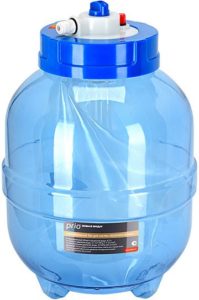
Flow-through
These include the following filters:
- The faucet attachment is a simple and inexpensive option that fits directly onto the water tap. Mainly separates water from Fe and neutralizes Cl with its residues.
- At-the-sink systems provide thorough cleaning and high performance. Disadvantages: inconvenient to use (you need to connect and disconnect the hose through which the water rises) and large size for ordinary kitchens.
- Under-sink systems are multi-stage filtration systems that disinfect and soften liquids. It requires free space under the sink and for the tap outlet; it is connected to the water pipes and mixer. Filters contain a set of modules and carry out filtration in several stages, while preserving useful elements and removing harmful ones. First of all, the water undergoes mechanical filtration, during which the largest inclusions are separated. Afterwards sorption and softening occurs, iron is removed. It is distinguished by deep cleaning and large resources; the disadvantages are the lack of mobility and an inflated price.
- Reverse osmosis systems - filtration occurs due to membranes that trap microorganisms and harmful substances. They have a purification rate of up to 99%, are durable and easy to use (the system is installed under the sink, and the tap is brought to the sink).The high cost is justified by the rare replacement of consumables.
- Pre-filters are located in the water supply system and can be installed for one tap or several.
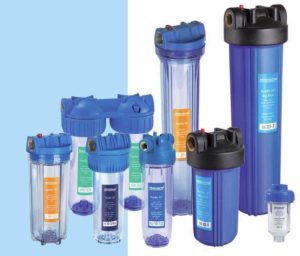
Which water filter is better?
Today, there are a variety of filtration methods. You can choose a separate device or an entire system that provides safe water purification. To make the right decision, you should first learn about the main characteristics and features of water treatment equipment:
- safety of the material used in the production of the filter. It should not have any foreign “chemical” odor;
- the degree of cleaning that the filter is capable of;
- strength and reliability of the system;
- the ability to prevent the spread of dangerous bacteria and other substances.
Important! You should not save on buying a filter, since cheap equipment will not provide the required degree of purification, but on the contrary, can “enrich” the water with foreign elements.
Criteria for choosing a water filter
To decide on the right filter for your home, you need to consider several important criteria:
- Number of filter layers - the more there are, the better the cleaning will be;
- Performance. On average, a person consumes 2 to 3 liters of water daily. Therefore, taking into account the people living in the family, the monthly fluid intake can be calculated. Based on this data and the performance of each model, you should choose the most optimal option for you. Filter capacity: jug 200-300 l; for sorption flow-through systems 4000-8000 l; for a reverse osmosis system 3000-6000 l; the “under-wash” filter system has 8000 liters.
- Features of filtration.It is important to determine the quality before filtration; this can be done by submitting the water for a special examination. You will find out the necessary indicators: pH, transparency, radiation level, hardness, amount of harmful elements and many others. With a high level of hardness and organic matter, it is worth considering reverse osmosis systems.
- Confirmation of the required level of cleaning (certification and acceptable standards). This can be found in the technical data sheet of the filtration system.
- Price. Prices for filters vary from 500-1000 rubles for filter jugs and faucet attachments to 12-13 thousand. This is due to the quality of the material and production technology.
- Free place. The most compact filter jug and faucet attachment. The most space in your kitchen will be taken up by under- and above-the-sink systems.
- Difficult to install and use. Some of the options require installation by special technicians and professional maintenance. It is necessary to regularly replace cartridges, wash and change membranes, clean valves and other parts.
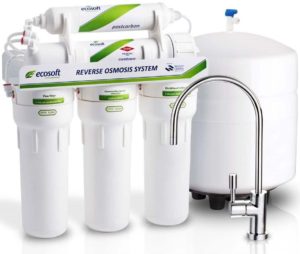
Top 10 best water filters
Rating of the best filters for 2018. Manufacturers justify the characteristics of their products, so many people prefer these filters.
Atoll A-550 STD
It stands out for its high-quality production: a durable and safe body with stiffening ribs that ensure the reliability of the structure. To begin with, the water through the cartridge is purified immediately upon receipt. Next, the liquid meets the coal segment; water enters it after a distributor that controls the flow of liquid. At the last stage, a special cartridge eliminates the remains of harmful impurities.
Advantages:
- high degree of purification;
- compactness;
- durability;
- Includes a container to hold water.
Flaws:
- price;
- difficult to find;
- slow filtration speed.
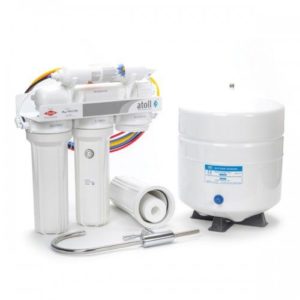
Geyser-ECO 2 in 1
The main advantage of this filter is ultrafiltration. It has a five-stage purification system, after which the water is freed from harmful elements and bacteria, softens, smell and unpleasant taste go away. Reduces Fe concentration, hardness and gets rid of Cl, while at the same time allowing minerals beneficial to humans to pass through.
Advantages:
- easy to connect;
- stable design;
- cleansing occurs in several stages;
- Safe materials were used.
Flaws:
- high price;
- slow speed;
- not suitable for hot water;
- It's hard to find replacement cartridges.
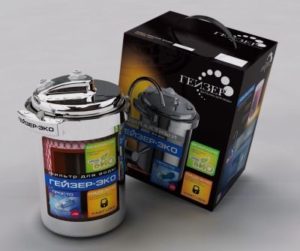
Geyser ECO
It is considered the most productive filter (3.6 l/min). When cleansing, Fe, salts and other unnecessary elements are removed. Provides mechanical and sorption cleaning; safe and reliable materials are used in production. It takes up quite a bit of space and is connected to the water supply. It is possible to install it yourself.
Advantages:
- compactness;
- excellent water purification;
- high performance;
- quality materials;
- easy installation.
Flaws:
- high price.
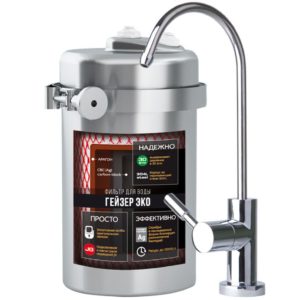
Barrier EXPERT Hard
The main advantage is high-quality and reliable cleaning, consisting of three stages. The optional faucet provided with your purchase must be installed. Barrier EXPERT Hard has a fairly fast flow rate (2 l/min). The resource potential is 10 thousand liters.
Advantages:
- high degree of cleansing and softening;
- will last a long time;
- high quality material;
- the price is lower compared to other similar models.
Flaws:
- the declared resource potential does not coincide with the actual one;
- unreliable ball valve.
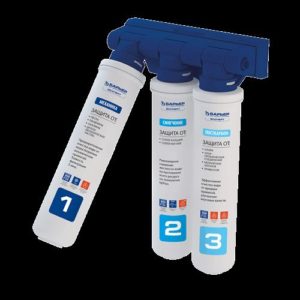
Aquaphor Crystal N
Contains a three-stage cleaning system. It is installed quite simply under the sink and connected to the water supply. It has a fairly fast productivity (2 l/min) and a resource potential of 6000 l.
Advantages:
- easy to install and use;
- cleaning in 3 stages;
- high performance.
Flaws:
- You can only use cold water;
- high price.
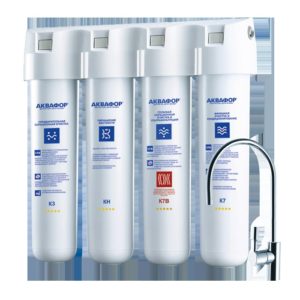
Geyser 1UZH Euro
Purifies water mainly from Cl and neutralizes odor using mechanical purification, sorption and ion exchange. Productivity is estimated at 1.5 l/min, and resource potential is 700 l.
Advantages:
- four-step cleansing;
- reasonable cost;
- compactness;
- additionally softens the water.
Flaws:
- Only cold water can be used.
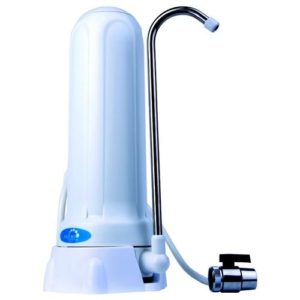
Barrier Comfort
Specially designed for shower room, purifies water and unnecessary unpleasant odor. Necessary for people with hypersensitive skin, suitable for children's skin. Simply attaches to the faucet position of the shower hose.
Advantages:
- speed – liter in 6 seconds;
- easy installation;
- affordable price;
- suitable for hot water;
- quality materials.
Flaws:
- the price for a replacement unit is too high;
- Reduces pressure in the shower.
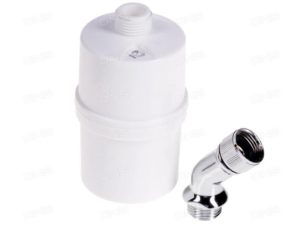
Brita Marella XL
A German-made filter removes dangerous impurities and salts from water that create scale. Average speed 3.5 l/min. Filtration resource 150 l.
Advantages:
- convenient calendar for tracking;
- additional 3 cartridges;
- large volume;
- purification speed.
Flaws:
- unreasonable cost;
- limited size of the purification module.
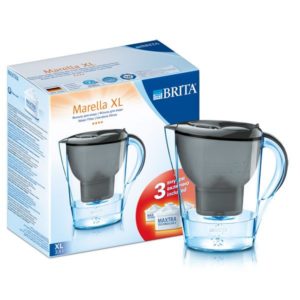
Barrier Grand
The filter jug, the active substance is activated carbon, does not allow all harmful and foreign additives.Durable plastic was used in production. Can clean up to 350 liters of liquid.
Advantages:
- convenient calendar for tracking shifts;
- easy to operate;
- great price;
- compactness.
Flaws:
- cannot be used for hot water;
- filtration speed.
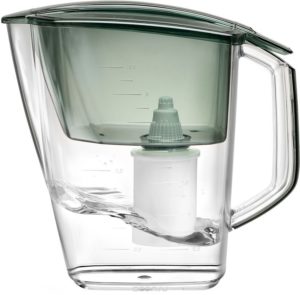
Aquaphor Ultra
Perfectly frees water from Cl and its residues, unnecessary trace elements and impurities. The volume of the jug is 3 liters. The resource potential is estimated to be up to 300 liters.
Advantages:
- varied color palette;
- there is a counter;
- acceptable price;
- quite high speed;
- filters do not require frequent changes.
Flaws:
- only for cold water;
- volume is only 3 liters.
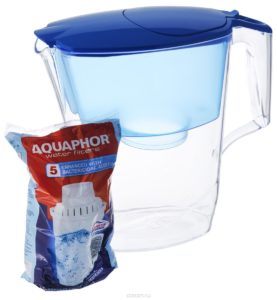
It should be noted that most filtering devices are similar in their functions and design; it’s just that cleaning some is more aimed at mechanical pollution, while others – Cl compounds.
Help: before purchasing, analyze the composition of the water and decide on the purpose of installing the filter.
For people with sensitive skin or children, it is worth considering pre-filters and faucet attachments.
To obtain clean water in a family of several people and on a limited budget, a filter jug is suitable.
The best choice for liquid purification is complex and multi-stage purification systems.

